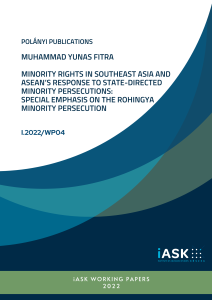Research & Studies
 About the Author
About the Author
Muhammad Yunas Fitra recently graduated from MA Program in International Studies in University of Pannonia, Kőszeg Campus, in January 2022. Upon finishing his secondary education in Indonesia, he received Turkish Government Scholarship to pursue his bachelor degree in Hacettepe University, Ankara, Turkey, in the Department of International Relations, from which he graduated in 2018. After working for a year in education sector in Indonesia, in 2019 he received Hungarian Government scholarship (Stipendium Hungaricum) to study in MA International Studies in University of Pannonia, Kőszeg Campus. His Master thesis and subsequent research mainly focuses on Southeast Asian society and politics, which include issues such as minority rights, ethnicity, and nationalism. He was granted an iASK research scholarship in 2022.
Abstract
Despite state-directed minority persecutions being one of the most common and high-profile case of human rights violation in Southeast Asia, minority rights and protection has not been high on the agenda, both in ASEAN regional level and within each of its member states’ domestic arrangements. Despite growing importance of ASEAN human rights regime (e.g. AICHR in 2009 and AHRD in 2012), minority rights provisions are omitted and nowhere to be found in ASEAN human rights documents. Consequently, amid multiple cases of state-directed minority persecutions, neither ASEAN, its human rights mechanism (AICHR), nor its member states are capable to give adequate responses to address these cases. Nowhere is this inadequacy in addressing state-directed minority persecution more visible than in Rohingya persecution by Myanmar government. While this minority persecution has lasted for decades and evolved into serious humanitarian conflict that also affect the region, ASEAN and its member states’ response to the conflict has been rendered ineffective and inadequate by this omission of minority rights in ASEAN human rights regime. This paper aims to address these questions: amid growing human rights regime of ASEAN, why are minority rights provisions continuously omitted? What forms and patterns of state-directed persecutions that minority groups in Southeast Asia face? How do ASEAN and its member states deal with the Rohingya minority persecution, and what does it tell us about minority rights and protection in Southeast Asia? Upon analyzing legal documents related to minority rights in both international, regional (ASEAN), and domestic (ASEAN member states) level, as well as analyzing discourses made by relevant leaders in addressing state-directed minority persecutions, this paper argues the combination of the ASEAN Way Principle (primacy of national sovereignty, non-interference in domestic affairs, and consensus-based decision-making) and ethnocultural nationalist identification of several ASEAN member states towards specific identity cores (ethnic, religious, linguistic core) as the underlying factors behind the state of minority rights and protection in Southeast Asia and ASEAN.
Keywords: Minority rights, State-directed minority persecutions, ASEAN, Southeast Asia, the Rohingya, the ASEAN Way, ethnocultural nationalism
I.2022/WP04Download
© 2017-2023, All Rights Reserved